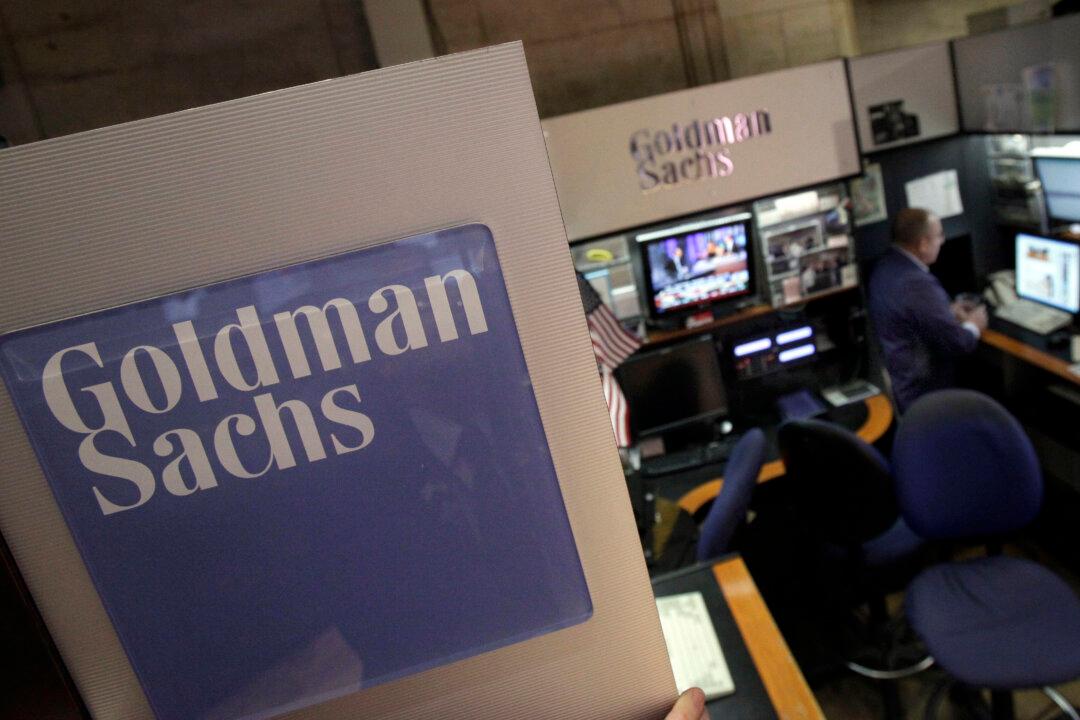NEW YORK—Goldman Sachs’ earnings soared in the third quarter, driven largely by trading and investment gains. The results easily surpassed analysts’ estimates.
The New York-based bank said Tuesday that it earned $2.1 billion, or $4.88 per share, up from $1.33 billion, or $2.90 per share, in the same period a year earlier. Wall Street analysts were expecting Goldman to earn $3.82 a share, according to FactSet.
While the firm’s investment banking division reported flat revenue, a reflection of the fact fewer companies did deals in the quarter, Goldman’s trading desks and the division where it invests its own money did exceptionally well.
Revenue in Goldman’s fixed income, currencies and commodities division jumped 34 percent to $1.96 billion. Goldman benefited from similar forces that helped boost trading of other major Wall Street banks, including JPMorgan Chase, Citigroup and Bank of America.
Wall Street banks benefited from volatility in bond and currency markets in the third quarter as Britain voted to leave the European Union, sending the pound swinging wildly, and as investors tried to guess when the Federal Reserve will begin raising interest rates. Strong performance on its trading desks is particularly important to Goldman, since it does not have a retail banking franchise to generate consistent revenue.
The firm’s return on common equity, a measure of profitability that is closely watched by analysts, was a strong 11.2 percent in the quarter.
“We saw solid performance across the franchise that helped counter typical seasonal weakness,” said Goldman Sachs CEO Lloyd Blankfein in a prepared statement.
Goldman’s investing and lending division, where the firm puts its own money into a myriad of investments from stocks, bonds and venture capital, had a strong quarter as well. Revenue there rose to $1.4 billion from $670 million.
In prepared remarks and responding to questions from investors, Goldman executives did talk about the firm’s recent moves into consumer banking. Goldman purchased the deposits of GE Capital earlier this year to create GS Bank, which offers online savings and CD accounts, and last week announced the launch of “Marcus,” a personal loan service named after one of the company’s founders.
The launch of Marcus is small so far, open to only customers with high credit scores and who get an invitation from Goldman to apply. But Goldman has talked openly about becoming more a player in consumer banking. It’s a major change for a company whose primary business for nearly 150 years was serving the well-to-do and advising companies on deals and mergers.
“Like with any new effort, we are taking a slow and methodical approach,” Harvey Schwartz, Goldman’s chief financial officer, said in a conference call with investors.
The firm set aside $3.21 billion to compensate its employees, up 36 percent from a year earlier, which is not a surprise with how well Goldman’s trading and investment businesses did. Goldman’s staff is largely paid in bonuses that accumulate throughout the year, and it’s generally the firm’s largest expense each year.
Goldman’s stock rose $2.63, or 1.6 percent, to $171.65 in mid-morning trading.





